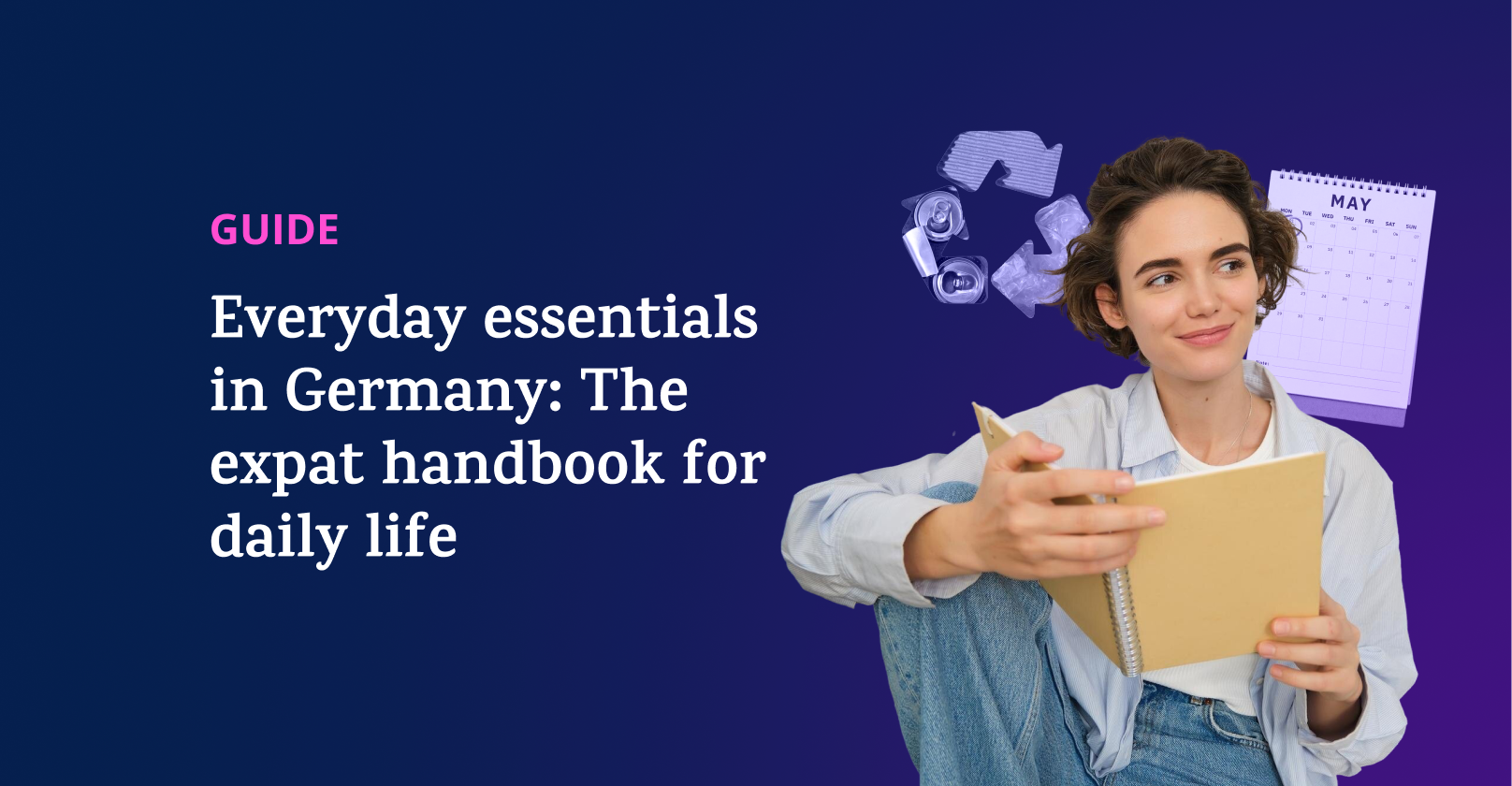13 long German words you’ll actually use (and one you’ll probably never say)

Let’s face it: German words have a reputation for being quite long. To non-German speakers, they can look less like vocabulary and more like a keyboard malfunction. But a good number of these impressively lengthy words are not mere linguistic curiosities. They’re alive and well in everyday German usage.
In this guide, we’ll explore 13 of the longest and most difficult German words you might actually use in real life. Plus, we’ll throw in one absurdly long outlier that exists purely to break records. Along the way, we’ll break down why German words get so long in the first place and how you can learn them without melting your brain. Spoiler: there’s logic behind the chaos.
Ready to surprise yourself with how usable some of the longest German words really are? Let’s dive in.
- Why are German words so long?
- 13 long German words you’ll actually use
- What’s the longest German word ever?
- How to learn long German words without getting overwhelmed
- FAQs
Why are German words so long?
German isn’t trying to scare you — it’s just playing by different rules.
The reason long German words exist at all comes down to one glorious concept: compound words. Instead of borrowing terms from other languages, German often takes two (or three, or four) existing words and glues them together into one mega-word that can seem quite literal in its translation.
At the core of this linguistic phenomenon are morphemes — the smallest units of meaning. Put simply, German loves combining morphemes. Add a prefix here, a suffix there, stack up a few nouns in between, and voilà: Krankenhausverwaltungssystem (hospital administration system) is born.
German grammar actually encourages this. There’s no real limit to how many nouns you can stack, as long as the meaning stays clear. It reflects a very German style of efficiency. In government, engineering and other professions where precision is king, compound words help communicate highly specific ideas without ambiguity.
So, yes, the words get long — but they’re not random. They’re custom-built for clarity.

Learn German with Lingoda
How it works

13 long German words you’ll actually use
1. ‘Kraftfahrzeughaftpflichtversicherung’ (car liability insurance)
- Definition: Car liability insurance
- Breakdown: Kraft (power) + Fahrzeug (vehicle) + Haftpflicht (liability) + Versicherung (insurance)
- Example: Ich brauche eine neue Kraftfahrzeughaftpflichtversicherung für mein Auto.
- Context: Bureaucratic/legal
- Pronunciation tip: Break it into eight parts: Kraft-fahr-zeug-haft-pflicht-ver-siche-rung
2. ‘Rechtsschutzversicherungsgesellschaften’ (legal protection insurance companies)
- Definition: Legal protection insurance companies
- Breakdown: Recht (law) + Schutz (protection) + Versicherung (insurance) + Gesellschaften (companies)
- Example: Rechtsschutzversicherungsgesellschaften bieten Hilfe bei juristischen Streitfällen.
- Context: Legal/insurance
- Note: Pluralization adds even more length. Take a deep breath before attempting this one.
3. ‘Aufenthaltsgenehmigung’ (residence permit)
- Definition: Residence permit
- Breakdown: Aufenthalt (residency/stay) + Genehmigung (permission)
- Example: Ich habe endlich meine Aufenthaltsgenehmigung bekommen!
- Context: Immigration/bureaucracy
- Pronunciation tip: Emphasize Auf-ent-halts to keep rhythm.
4. ‘Geschwindigkeitsbegrenzung’ (speed limit)
- Definition: Speed limit
- Breakdown: Geschwindigkeit (speed) + Begrenzung (limitation)
- Example: Die Geschwindigkeitsbegrenzung auf der Autobahn beträgt 130 km/h.
- Context: Road regulations
5. ‘Unfallversicherungsgesetz’ (accident insurance law)
- Definition: Accident insurance law
- Breakdown: Unfall (accident) + Versicherung (insurance) + Gesetz (law)
- Example: Das Unfallversicherungsgesetz schützt Arbeitnehmer im Falle eines Arbeitsunfalls.
- Context: Legal/workplace safety
6. ‘Hausratsversicherung’ (home contents insurance)
- Definition: Home contents insurance
- Breakdown: Hausrat (household contents) + Versicherung (insurance)
- Example: Meine Hausratsversicherung deckt auch Wasserschäden ab.
- Context: Domestic/insurance
7. ‘Lieferungsbestätigung’ (delivery confirmation)
- Definition: Delivery confirmation
- Breakdown: Lieferung (delivery) + Bestätigung (confirmation)
- Example: Bitte senden Sie uns eine Lieferungsbestätigung per E-Mail.
- Context: Business/logistics
8. ‘Gesundheitsschutzmaßnahmen’ (health protection measures)
- Definition: Health protection measures
- Breakdown: Gesundheit (health) + Schutz (protection) + Maßnahmen (measures)
- Example: Die Regierung hat neue Gesundheitsschutzmaßnahmen eingeführt.
- Context: Public health/government policy
9. ‘Arbeitsunfähigkeitsbescheinigung’ (sick leave certificate)
- Definition: Sick leave certificate
- Breakdown: Arbeitsunfähigkeit (inability to work) + Bescheinigung (certificate)
- Example: Der Arzt hat mir eine Arbeitsunfähigkeitsbescheinigung ausgestellt.
- Context: Workplace/medical
- Pronunciation tip: Tackle it in chunks: Ar-beits-un-fä-hig-keits-be-schei-ni-gung.
10. ‘Lebensmittelunverträglichkeit’ (food intolerance)
- Definition: Food intolerance
- Breakdown: Lebensmittel (food) + Unverträglichkeit (intolerance)
- Example: Ich habe eine Lebensmittelunverträglichkeit gegenüber Laktose.
- Context: Medical/dietary
11. ‘Personalausweisnummer’ (ID card number)
- Definition: ID card number
- Breakdown: Personalausweis (ID card) + Nummer (number)
- Example: Bitte geben Sie Ihre Personalausweisnummer an.
- Context: Administrative/identification
12. ‘Straßenverkehrsordnung’ (road traffic regulations)
- Definition: Road traffic regulations
- Breakdown: Straße (street) + Verkehr (traffic) + Ordnung (rules/regulations)
- Example: Die Straßenverkehrsordnung regelt das Verhalten im Straßenverkehr.
- Context: Legal/road safety
13. ‘Versicherungsgesellschaft’ (insurance company)
- Definition: Insurance company
- Breakdown: Versicherung (insurance) + Gesellschaft (company)
- Example: Die Versicherungsgesellschaft hat den Schaden übernommen.
- Context: Business/legal
What’s the longest German word ever?
Ah, yes, the legend itself:
Rindfleischetikettierungsüberwachungsaufgabenübertragungsgesetz (63 letters long — yes, we counted.)
Definition: Beef labeling supervision duties delegation law
Breakdown:
- Rindfleisch – beef
- Etikettierung – labeling
- Überwachung – supervision
- Aufgaben – duties
- Übertragung – transfer/delegation
- Gesetz – law
This Frankenstein of a noun was coined in the state of Mecklenburg-Vorpommern for a very specific piece of legislation about the authority responsible for monitoring beef labeling. Bureaucracy, meet linguistic maximalism.
Don’t worry, though. This one is definitely considered advanced German vocabulary, and as such it’s not necessary to learn right away (or ever, if we’re being honest). Though the law itself was repealed in 2013, the unwieldy word it spawned lives on in memes, textbooks and cocktail party trivia. Why? Because it’s a perfect example of how German can technically build words with no upper limit in terms of length — as long as the logic holds.
How to learn long German words without getting overwhelmed
Long German words aren’t a memory test — they’re more like puzzles. And once you know how to approach them, they become a lot less intimidating. Here’s a simple, repeatable strategy:
- Break it into parts. Start by slicing the word into smaller chunks. Look for familiar roots: Versicherung, Gesetz, Nummer. These are your anchor points.
- Identify the root word. What’s the core idea? In Hausratsversicherung, the root is Versicherung (insurance). Everything before it just makes it more specific.
- Use context. Don’t try to learn words in a vacuum. Study and use them in sentences, emails, documents and more. Real use gives real meaning.
- Repetition beats memorization. You don’t need a flashcard for Geschwindigkeitsbegrenzung — you just need to see it on enough highway signs.
That’s where Lingoda can help. In live, structured classes with native-level teachers, you’ll hear words in context and practice them in conversation until they feel natural.
What is the longest German word ever used?
Rindfleischetikettierungsüberwachungsaufgabenübertragungsgesetz (63 letters) — a former legal term.
Are long German words common in everyday conversation?
Some are, especially in admin or work contexts. But monster-length words are usually avoided in casual speech.
Long words, shortcuts to language mastery
Long German words aren’t here to scare you. Many of them are practical, everyday terms, especially in work, legal and health contexts. When you break them down and see them in use, they stop being intimidating.
Remember: long words are often just short ideas stacked together. Learn them in pieces, use them in context, and practice regularly. Set yourself a “word of the week” challenge: pick one chunky German word, learn it, use it in sentences and try it out loud. Lingoda’s live classes are perfect for this kind of real-time, real-language learning.Tackle them one at a time, and soon you'll be casually dropping Geschwindigkeitsbegrenzung into conversations like it’s no big deal. Because for you, it won’t be.

Learn German with Lingoda
How it works

















